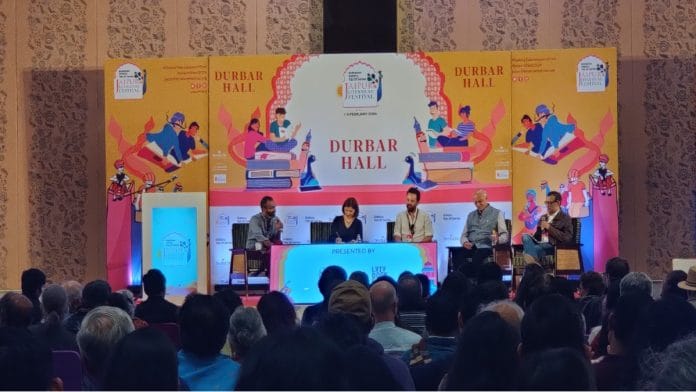Jaipur: War, though waged by nation states, is deeply personal for millions who have very little say in the declaration of it. At a time when war has most unfortunately become the new normal in different parts of the world, it is imperative that those who have seen war up close discuss what leads to it and how it can be prevented by allowing rational heads to prevail.
This is exactly what four panelists, experts in their own right, set out to do during a panel discussion aptly titled ‘The Dogs of War’ on the third day of the Jaipur Literature Festival (JLF) Saturday.
The discussion, moderated by ThePrint’s Consulting Editor Praveen Swami, began with author and journalist Anjan Sundaram sharing his views on why he chose not to adhere to the old dictum among reporters: never insert yourself in the story.
Talking about his book Breakup: A Marriage in Wartime, in which he essays his experiences as a war correspondent covering ethnic cleansing in the Central African Republic and the impact it had on his marital life, he said the idea behind writing the book in the first person was to highlight the personal side of war.
Sundaram, an IIT-Madras alum, added that war has become the new normal in so many parts of the world that a sense of “fatigue” sets in each time the subject comes up for discussion.
He went on to share how during his time in the Central African Republic, he and his American colleague were approached by villagers who were asked to vacate their homes by members of an armed militia by 8 am the next morning or prepare to meet their deaths.
Sundaram said he and his colleague made multiple efforts to alert authorities and seek help, but to no avail. The two then decided to stay back with the villagers and conveyed to the local embassy there that an American citizen may be among those likely to be shot dead the next morning if there is no intervention.
Officials in the US then swung into action and warned the local leaders there that the death of an American citizen would make them an enemy of the US and the 8 am deadline was called off, said Sundaram highlighting the disparity between the cost of thousands of African lives and one American life.
Historian and author Olesya Khromeychuk, currently serving as Director of the Ukrainian Institute London, elaborated on this further with a sombre anecdote: the question now is how many people have died for this war or that war to stay in the headlines.
Her remark was a reference to the war in Ukraine which claimed the life of her brother, who was serving on the frontline in eastern Ukraine. Her book The Death of a Soldier Told by His Sister is a detailed account of how the Russian invasion of Ukraine dehumanised millions of Ukrainian civilians who were forced to pick up arms to defend their country against an expansionist neighbour, who also happens to be among the world’s biggest military and nuclear powers.
“Cultural violence precedes physical violence,” she said in the context of Russia’s adventurism in the Ukrainian regions of Donetsk and Luhansk.
Citing the annexation of Crimea in 2014 and how it emboldened the Kremlin to launch a “special military operation” in Ukraine in 2022, she added: “If you tolerate the oppressors, they keep pushing.”
Antony Loewenstein, noted Australian-German investigative journalist, author, and filmmaker, built on Khromeychuk’s argument about the pretext of war but in the context of the ongoing conflict in the Gaza Strip.
“Israel weaponised Jewish suffering,” said Loewenstein, the author of The Palestine Laboratory which details how the Israeli military complex uses Palestinian territories as a “testing ground for weaponry and surveillance technology that they then export around the world”.
He then went on to make a larger point in an apparent reference to the scale of devastation caused by Israeli retaliatory strikes in Gaza in the wake of the terrorist attack by Hamas last October: “Israel is exporting not just weapons but the idea that you can get away with it”.
Former foreign secretary Shivshankar Menon who also served as National Security Adviser to former prime minister Manmohan Singh, then explained that it is important to make a distinction between the people and the state, in the sense that it is leaders — no different than the average citizen — who make the decision to declare war and not the state itself.
He went on to add that the world today is so interdependent that the consequences of war in one part of the world are felt everywhere.
These insights, against the backdrop of the wars in Ukraine, Gaza, parts of Africa and the Middle East, are sure to have compelled the audience to heed to Spanish-American philosopher George Santayana’s prophetic words: “Only the dead have seen the end of the war.”
ThePrint is a digital media partner for Jaipur Literature Festival 2024
(Edited by Nida Fatima Siddiqui)
Also Read: ‘When the editor becomes the edited’ — at JLF, Vir Sanghvi and Meru Gokhale on nuances of editing






